Admin
[PRESS RELEASE] NIDCOM Facilitates The Return Of Adeola, The Daughter Of Actress Jumoke George From Mali
LAGOS, May 19, 2025 : It was a happy reunion on Monday as the lost-but-found- Adeola, the 41-year old daughter of Actress Jumoke George finally reunited with her mother and family in Lagos on Monday.
This was sequel to an alarm raised by Jumoke George about not hearing from her daughter in four years during an interview on the Talk to B show hosted by Abiola Bayo.
Following the interview, the host, Biola had reaching f out to the Federal Government of Nigeria through Nigerians in Diaspora Commission (NIDCOM), whose Chairman immediately got in touch with the Ag Nigerian High Commissioner, Amb Ugo Chime who both facilitated her transportation back home
Hon. Abike Dabiri-Erewa, NIDCOM Chairman/CEO, was at hand in Lagos office of the Commission where the very excited Adeola, thanked the NiDCOM Chairman, the Acting Nigeria Ambassador in Mali, Amb. Ugo Chime, and popular actress, Abiola Bayo, who highlighted her mothers ordeal on her programme “ Talk with B” as well as Actor Niyi Johnson who was also in attendance.
Dabiri-Erewa welcomed Adeola, and hoped that others would learn from her story, a story of being deceived into a job that never was.
She warned others to resist any temptation of any supposed job offers in Libya, Mali as its all journey to slavery.
She said she was promised, through someone close to her , to get employed in a Pharmacy. Only to get there to be told she had been sold to a “ madam”,a move she vehemently resisted.
Adeola said she did not get in touch with her family, out of shame of unfulfilled dreams, and expressed happiness to be back.
Adeola had been living with her grandmother in Ibadan and was last seen after informing the family she was travelling to Lagos.
Abiola Bayo, the host of the program, Talk with B, expressed deep gratitude to the Federal government for its speedy intervention.
E-signed.
Abdur-Rahman Balogun
Director of Media, Public Relations and Protocols Unit NiDCOM, Abuja.
[OPINION] Beautiful but barren - Gabriel Agbo
“This town is located in beautiful natural surroundings, as you can see. But the water is bad, and the land is unproductive.” 2 Kings 2:19
It is time to break everything that has caused barrenness in your life. Barrenness is infertility, unfruitfulness, unproductiveness. While beauty is simply attractiveness, gorgeousness, well arranged, etc. So, when you see a thing looking beautiful and yet not productive, then there is a clear case of disagreement. There is a problem. And this is what some of us are currently going through in life. Your physical looks, your education, location, age, connection and even background are not in agreement with your current level and position in life. You know very well that this is not where you are supposed to be, considering the grace and endowments in your life, but you cannot say exactly what has gone wrong. It’s like something is pulling you back and you don’t know what to do to break out of the invisible barriers. You helplessly and angrily watch people with less qualification overtake you.
Maybe, it is a family or medical condition that you cannot fully explain the cause. Some live close to the blessing, but unfortunately languish in penury, pain and sorrow. Yet, some do everything that is expected of them, but have their dreams aborted at the point of breakthrough. You experience unidentifiable forces resisting all your efforts to advance into your destiny. You cannot live the life that God wants from you. If you are going through any of these, I would like to tell you that you have come to the point of your deliverance. Today, everything that has held your life in bondage will be broken in the name of Jesus!
This was exactly what the people of Jericho were going through. Their city was well situated. It was close to the richly-endowed River Jordan. It had streams running through it, and well secured because of its topography. But the land was barren and the water from the streams was bad; causing death, infertility and miscarriages. Terrible! What was the problem? The city was labouring under a heavy curse. Now, you remember what Joshua did after destroying the place during his time? He said that the curse of the LORD will be upon the city; that anybody that will try to rebuild it will lay the foundation with the cost of his firstborn and set up the gates with the life of his youngest child. Now, hundreds of years after, during the ungodly reign of Ahab, in disobedience, a man from Bethel called Hiel rebuilt the city. When he laid the foundation his first son, Abiram, died. And when he had finished and set up the gates, his youngest son, Segub, died. Presumably, his other children had died in between. So, Jericho has been labouring under this terrible curse until this particular encounter with Elisha the prophet. Before we continue, please get my books Breaking Generational Curses: Claiming Your Freedom and Power of Midnight Prayer by Gabriel Agbo now, so that you can fully appreciate what we are discussing here.
The prophet Elisha was just fresh from receiving the anointing from the ‘Prophet of Fire’ Elijah, when the elders of the city, with tears, ran to him seeking for help, “We have a problem, my lord…,’ They told him all they were going through. And prophetically, the man of God ordered them to bring a new bowl with salt. He went to the spring that supplied water to the town and threw the salt saying, “This is what the LORD says: I have made this water wholesome. It will no longer cause death or infertility.” And immediately the water and land were healed from that day. Praise God! Thank God the people and the elders of Jericho recognized that they had a problem and went to the right place.
What is your problem? What is happening in your life? Your relationships, Job and Family? What is happening to your nation? Are they beautifully situated by unproductive?? Are you labouring without a commensurate result? Are you toiling through the night without a catch? I just remembered Peter. He toiled all night without catching any fish. But when Jesus came into the situation, the story changed. Today, I pray that very curse over you be broken in the mighty name of Jesus! God wants you to be fruitful. God said that it is his wish that every part of your life be productive and prosperous. Till next week. God bless!
[OPINION] Banks’ profits, charges and customers’ complaints - Etim Etim
Grumbling about banks’ profit is a favourite Nigerian pastime that gets louder and louder in the first quarter of the year when their financial performance for the previous year is announced. But lately, the grumblers have shifted attention to bank charges, with some arguing that the lenders are too profitable and should waive these deductions from customers’ accounts. ‘’How do the banks make so much profit while the rest of the economy is collapsing?’’; ‘’Banks are stealing from their customers through dubious charges;’’ and ‘’Let’s boycott Bank XYZ…’’ are some of the commonest protestations.
On Wednesday, May 14, The Guardian published an article with a rather ghoulish title, ‘’The blood profits of Nigerian banks’’, written by Dr. Emmanuel Owhoko, identified as a public policy analyst, author and journalist. The piece drips with obvious irritations about banks’ ‘’growing quest for abnormal profits through use of arbitrary charges, devoid of empathy for emotional state of customers’’. It suggests that bankers are just a lazy bunch that does nothing other than to debit customers’ accounts and convert the proceeds into huge profits. But the essay is based on ignorant assumptions and poor knowledge of the operations of banks. As a former banker, I feel compelled to intervene in a very simple manner.
First, why do banks make so much profit? The reason is simple. Their unique role and peculiar functions confer on them some advantages that other industries don’t have. A typical bank sells a wide range of services to millions of customers every day and night, including weekends and public holidays. Such a business will most likely be profitable unless it is mismanaged. A top tier Nigerian bank has millions of customers (Access Bank has over 60 million, for example) and each of these customers has one thing or the other to buy from their bank. Even if you have a savings account from which you rarely make withdrawals, your bank is making money off you by lending your money at a higher interest rate than it’s paying you. It’s called financial intermediation; and it’s the main reason a bank exists and the core source of its income.
In addition to lending (and there are many types of it), banks also offer a wide range of other services such as financial advisory; wealth management; investment banking; foreign exchange services, etc, to millions of its customers and get paid for them. In some cases, a bank is part of a holding company that offers a lot more varied and diversified services such as insurance; pensions; fintechs and payments. It therefore follows that almost every adult person, including students, is in a regular need of one banking service or the other. Such inevitability offers the industry unique benefits that can only translate onto profits.
Unlike a manufacturing business, a bank does not import raw materials; has no complex machines and conveyor belts that break down; does not pay customs and excise duties for spares and inputs and does not deal with the problems of unsold goods, huge inventory costs and products recall. The peculiarity of banking business and its inherent advantage became clearer last year. While many Nigerian manufacturers with dollar-denominated loans suffered huge losses due to Naira depreciation, banks actually recorded fat gains from their massive dollar holdings.
A bank simply makes the bulk of its revenues from financial intermediation – taking money from the surplus side and giving it the deficit side with a margin. So, consider a bank with a loan book of N500 billion at an average interest rate of 20%. How much interest income is that? There is no business as lucrative as money lending, right from history; and there’s no reason for a bank not be profitable, unless it is mismanaged. But banking is also a very risky business (actually, the technical name for a loan is ‘’risk asset’’) with its own peculiar challenges. Many banks, including some very big ones overseas have failed. Nigeria has also recorded many cases of bank failures. One bad loan can almost sink a bank. This is why it is a highly regulated industry.
Dr. Owhoko writes in his article which I referred to earlier: ‘’Implicitly, these charges constitute huge burden on the average bank customer who contends daily with depletion in his or her account balances. Corporate customers or businesses are also not spared from these questionable charges that have become a drain on the balance sheet of companies’’. A bank is a commercial and profit-oriented business whose services and activities are well regulated. A bank must stay profitable, safe, sound and stable. To that extent, Banks and other Financial Industry Act (BOFIA), the law that guides banking businesses, stipulates that all services provided by a bank must be paid for by the customer. In other words, there’s no free lunch in the banking hall. A customer - whether corporate or individual – should never expect to obtain free services from a bank. The charges that Dr. Owhoko and many others complain so stridently about are just the cost you pay for the services your bank renders to you.
I often wonder why the same people who whine about bank charges are eager to pay various telecommunications charges; cable TV subscription; dry cleaning bills; air tickets; restaurant bills and other sundry obligations without complaints, but are quick to bicker over bank charges. Are banks charity organizations? Don’t they understand the risks involved in keeping trillions of customers’ deposit safe? If you think that bank charges are too high, you may wish to consider keeping your money at home and watch it grow!
A bank provides the safest and most reliable place to keep your financial treasures. But it comes with huge costs to the banks. Charges on customers’ account are therefore meant to help offset these costs so that the banks could continue to operate in a safe, sound and stable manner. The idea that these charges, which are typically in small amounts, are the main sources of banks' profit is erroneous. Banks make the bulk of their income from interest earned on loans, investments and other assets. Minor debits like account maintenance fees and SMS charges constitute a small portion of the bottom line.
Nigerian banks should be commended for their important roles in the economy. They provide funding for big and small businesses like Dangote Industries; the airline industry; manufacturing sector; public sector and even small businesses like schools; restaurants or a corner shop. Instead of bellyaching over minor charges, Nigerians should ask their governments to provide security, stable electricity and adequate infrastructure that banks spend so much to provide.
Etim, a retired banker, is the publisher and editor-in-chief of Policy and Politics
Akpabio Concludes Empowerment, Project Commissioning In Akwa Ibom North West Senatorial District
President of the Senate, Godswill Akpabio has successfully concluded another phase of empowerment initiatives and projects commissioning in the Akwa Ibom Northwest Senatorial District.
The events, which began Friday, May 16th came to an end on May 18 with projects commissioned in Abak, Ikot Ekpene, and Essien Udim Local Government Areas, with Constituents benefitting from projects facilitated by Akpabio.
In Abak council Area, Senate President Akpabio commissioned several projects, such as roads, ICT Centers, classroom blocks, ultra-modern markets, police stations among others.
The Chairman of Abak Local Government Area, Ime Charles, and the Akwa Ibom State Commissioner of Police, CP Baba Azare, expressed their delight and gratitude for the impactful developments.
In Ikot Ekpene, the Senate President commissioned a one storey 12 classrooms block at State College, Ikot Ekpene among other projects located in the area.
The final stop was Essien Udim LGA, where Senator Akpabio commissioned life-changing projects like health centers, ultra modern markets, classroom blocks, ICT hubs, roads, and a police station in Nto Nsek Village.
The Chairman of Essien Udim Local Government Area, Hon. Ntiedo Usoro, alongside CP Baba Azare, once again conveyed their appreciation for the Senator’s dedication to community development.
The three-day tour represents the second phase of empowerment for the people of Akwa Ibom North West Senatorial District, in fulfilment of his campaign promises to his Constituents in 2023.
Jackson Udom,
Special Assistant, Media To The President Of The Senate
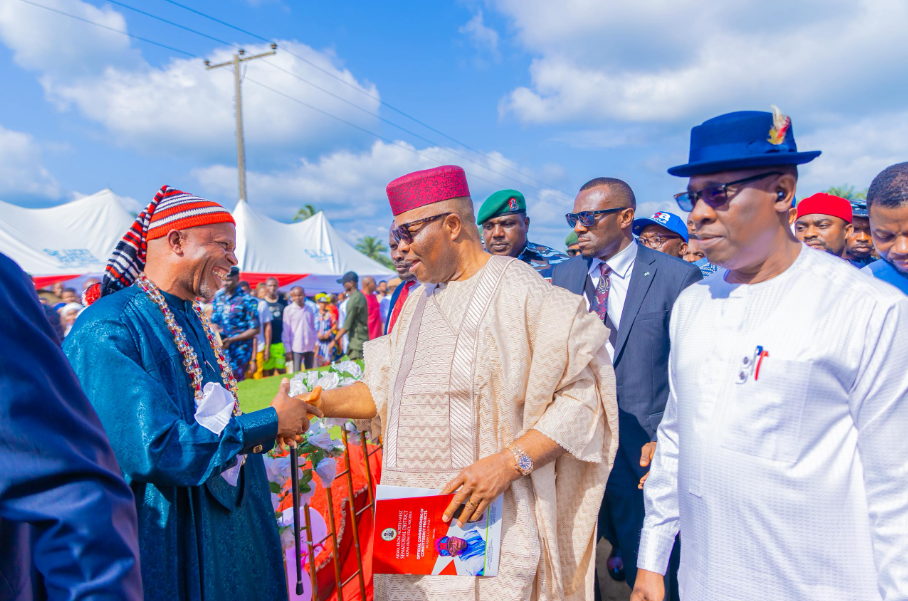
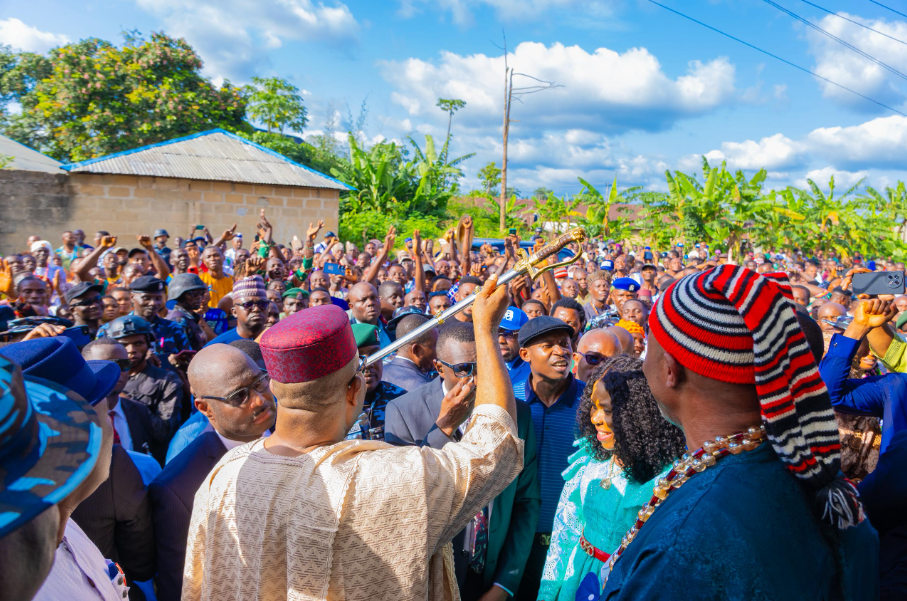

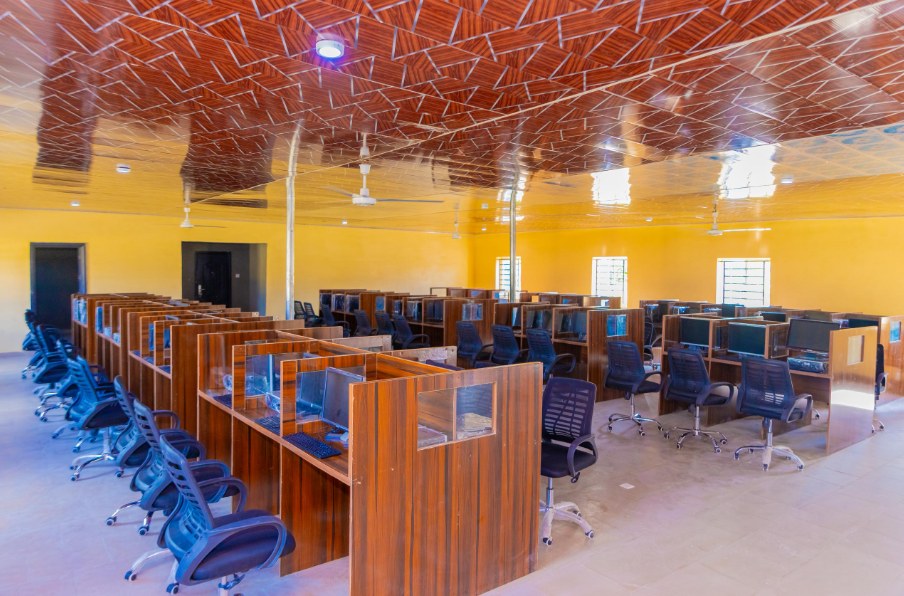
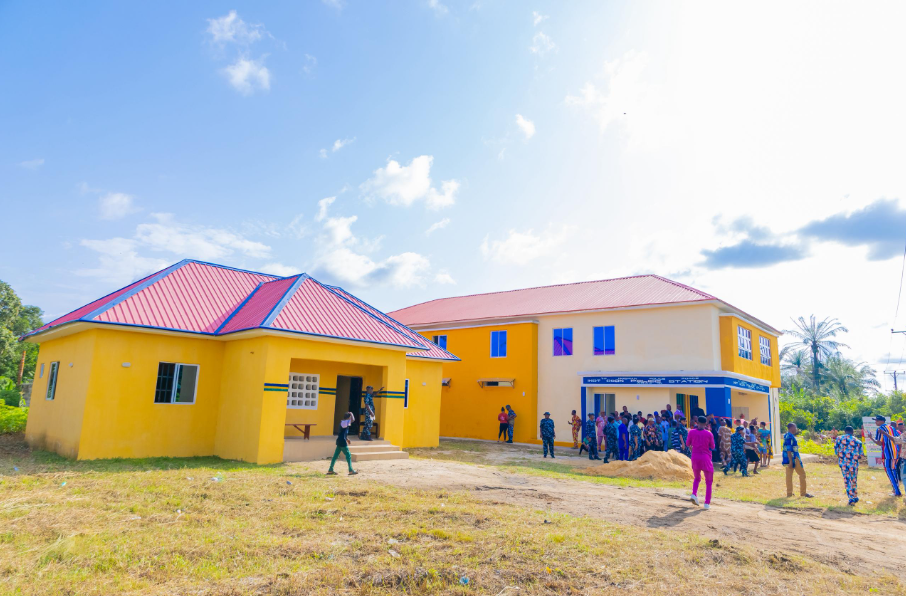


[OPINION] Telling Self-Acclaimed “Ministers Of God” That “Born Againism” Is Beyond Abstinence From Smoking, Drinking And Womanizing - Isaac Asabor
In today’s Nigerian church, particularly within Pentecostal circles, the phrase “Born Again” has been reduced to a tired cliché, frequently declared but deeply misunderstood. For many self-acclaimed ministers of God, being born again is nothing more than quitting smoking, dropping the bottle, and walking away from illicit affairs. They flaunt these changes like badges of spiritual honour, parading them as the ultimate evidence of salvation.
But let us be clear:”Born Againism” is not behaviour modification, it is heart transformation. The idea that one can claim spiritual rebirth just by avoiding a few visible vices is not only misleading, but it also trivializes the profound message of Jesus Christ. The Saviour did not endure Calvary just so men could stop smoking and drinking. He died to radically change the heart of man, not merely his habits.
Too many self-proclaimed ministers preach a gospel of surface-level change. To them, being born again means looking “clean,” praying loudly, dressing modestly, and shouting “Hallelujah” at every opportunity. Their sermons obsess over alcohol, trousers, hairstyles, and nightclubs, while ignoring the weightier matters; pride, corruption, bitterness, tribalism, and greed. These ministers major in the minors and overlook the transformative depth of genuine salvation.
Let us not forget the words of Jesus in John 3:3, when He said to Nicodemus: “Except a man be born again, he cannot see the kingdom of God.” That is not a call to switch from cigarettes to chewing gum. It is a divine mandate for spiritual rebirth, one that breaks the old nature and births a new creation entirely. As Paul affirms in 2 Corinthians 5:17: “If any man be in Christ, he is a new creature: old things are passed away; behold, all things are become new.”
The tragedy is that many pastors who shout about abstinence are themselves drowning in spiritual filth, manipulating congregants, hoarding wealth, engaging in tribal politics, and nursing unforgiveness. Some of them would not touch alcohol but would not hesitate to break a home or exploit the vulnerable. What hypocrisy!
Jesus warned about this kind of religious pretense in Matthew 23:25-26: “Woe to you, teachers of the law and Pharisees, you hypocrites! You clean the outside of the cup and dish, but inside they are full of greed and self-indulgence.”
That warning might as well be addressed to today’s spiritual showmen, those who abstain from wine but are intoxicated with power, who avoid women but seduce followers with false prophecies and manipulated dreams. They have replaced the authentic gospel with a hollow performance.
Let us face it: even cultists and scammers can quit alcohol and womanizing. Some do it to maintain their edge. But salvation is not about changing habits for convenience; it is about changing allegiance, from self to Christ, from darkness to light.
In Nigeria, the “born again” label has become cosmetic. It is more about how you dress, how you sound when you pray, and whether you attend vigil or not. We now judge spirituality by appearance, not by fruit. Meanwhile, those who carry Bibles to the office still inflate contracts, collect bribes, and treat subordinates with disdain.
Some pastors go as far as policing appearances, monitoring skirt lengths and makeup shades, yet remain silent about gossip, unforgiveness, tribal hate, and political compromise within their own ranks. Is this the gospel of Christ or a man-made religion that only targets what the eyes can see?
If being born again does not affect how you treat your spouse, how you handle money, how you conduct business, or how you lead others, then you are not born again, you are just well-behaved.
It is time to confront self-acclaimed ministers of God and call them to accountability. The gospel must not be reduced to a three-point checklist of “I don’t smoke, I don’t drink, and I don’t womanize.” That is religion, not regeneration. That is morality, not spirituality.
Born againism must touch every sphere of a person’s life: how you think, how you forgive, how you speak, how you handle authority, and how you respond when no one is watching. It must reflect in your politics, your business, your family, and your daily conduct. Anything less is a poor imitation.
Philippians 2:5 charges believers: “Let this mind be in you, which was also in Christ Jesus.” That is the ultimate benchmark. Not what you quit, but who you have become.
To every pastor and preacher who thinks abstaining from beer and sex makes one born again: you are leading people into deception. Preach Christ, not cosmetics. Teach transformation, not tradition. Point people to the cross, not a code of conduct.
Born againism is a divine encounter, not a checklist. It is time to return to the true gospel, deep, sincere, and life-altering.
And to the man or woman who claims to be born again yet is still full of pride, bitterness, and hypocrisy: stop fooling yourself. Real salvation changes the heart, not just the habits. So, let the Church wake up, and let the ministers stop lying to themselves.
[OPINION] Dele Momodu At 65: A Journey Of Dedication, Diplomacy, And Distinction - Abdulrofiu Muhammed Temitayo
Greatness started in the realm of human creation in eight stages of human development, according to ego psychologist Erik Erikson: a form of ascending from being an infant to toddlerhood to preschool years to early school years to adolescence to young adulthood to middle adulthood to late adulthood. I could imagine how the growth of a child will turn out to be great if it is not the assemblies, interactions, continuous learning (thorough and compendious), and affections both covert and overt. This is the citadel that a man called Dele Momodu spurted from; his journey into the rise of success cannot be underestimated with the level of dedication, diligence, dutifulness, and hard work. His interpersonal relationships are superb and imbued with a high sense of humility as he celebrated his 65th birthday last week with encomiums showering on him from friends, families and well-wishers all over the world.
Dele Momodu mounted the ladder of greatness with consistency and tenacity from his mother’s advice that he should not give up, from being a graduate of Yoruba language at the University of Ife (now Obafemi Awolowo University) to obtaining a master’s degree in English Literature, growing up to establish his own brand of magazine and newspaper, proving the golden word of an adage that says a child who knows how to wash hands will eat with the elders.
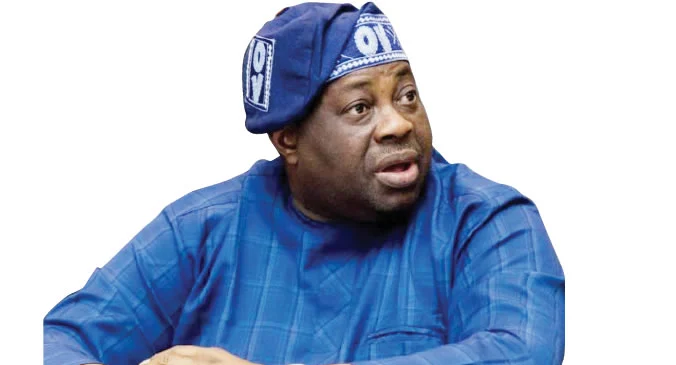
One unique relationship that paved the way for Dele Momodu is that of Chief Moshood Kashimawo Olawale Abiola (MKO) that was both professional and deeply personal, rooted in shared ideals and a commitment to Nigeria’s democratic future. Ovation Magazine’s dream started when Momodu began his journey with MKO in 1988 when he joined the Concord Group of Newspapers, owned by Abiola. He started as a staff writer for African Concord magazine; Momodu quickly soared through the ranks, becoming the pioneer staff of Weekend Concord and later its news editor. His dedication and editorial prowess secured him the position of literary editor at Classique, a celebrity magazine owned by May Ellen Ezekiel, making him one of Nigeria’s highest-paid editors at the time.
This brings the deeply personal and transformative story about a life-changing experience he narrated in the midst of his friends that Chief Moshood Kashimonwo Abiola ordered him to visit him in his home through a call from his godfather, Chief Alex Duduyemi, who sensed his distress in London. He was on the brink of suicide due to financial despair and personal struggles when driving aimlessly in London, overwhelmed by a sense of failure. This timely intervention led to a profound conversation that helped him regain hope and purpose. And surprisingly, MKO gave him a cheque for 4,000 pounds in a banter exchange with Bashorun and asked him, ‘Can’t you put a signature on the thigh of a woman?’ The statement that changed his life is ‘Daddy, I don’t have money’. In 1991, it was a huge sum of money for the Ovation Magazine boss; he utilised it wisely to form his empire that upstaged the relevance in the world at large. Momodu described his emotional reaction to this act of kindness, highlighting Abiola’s generosity and the profound impact it had on him. These stories not only shed light on Dele Momodu’s personal journey but also underscore the themes of resilience, divine intervention, and the profound influence of mentorship and generosity in shaping lives.

Dele Momodu and Buhari
One crucial attraction you cannot keep off Akinrogun of Gbonganland is the testimony Sextus gave Marcus Aurelius in his book Meditations that “To show intuitive sympathy for friends, tolerance to amateurs and sloppy thinkers. His ability to get along with everyone: sharing his company was the highest of compliments, and the opportunity an honour for those around him.” Apollonius’ admonition in the same book is “to have learnt how to accept favours from friends without losing your self-respect or appearing ungrateful”. This is why you will see Momodu as a centre of attraction to the world of politicians, business moguls, celebrities, and monarchs.
Dele Momodu is widely recognised for his ability to maintain relationships across Nigeria’s complex political landscape. His network includes influential figures from various political parties and ideologies, and he has often been seen navigating these differences with a combination of tact, diplomacy, and a commitment to national unity. As a media icon in Africa, for promoting African excellence and culture, his work has helped in bridging the gap between Africans in the diaspora and those on the continent, making him one of the most respected figures in Nigerian media and public life.

Dele Momodu and Tinubu
Dele Momodu has paid his dues to journalism; may politics pay him too!
Temitayo writes from Benin City, Edo State Capital
[OPINION] Revolution of Values: Prof. Oloyede as a Model of Transformational Leadership - Richard Odusanya
In an era where public service is often clouded by inefficiency and distrust, Professor Is-haq Olanrewaju Oloyede’s leadership at the Joint Admissions and Matriculation Board (JAMB) stands as a powerful testament that honesty and competence can—and must—coexist in public institutions. His tenure exemplifies what it means to lead with integrity, purpose, and a deep sense of accountability to the public good.
The erudite Professor and a former distinguished Vice Chancellor is widely regarded as a no-nonsense administrator, known for his principled leadership and commitment to institutional reform. This reputation was recently reaffirmed in his candid response to the widespread complaints over the 2025 UTME results, where he openly acknowledged that technical glitches had negatively impacted some candidates’ scores. In a nation where denial and blame-shifting are too often the norm, his public admission of fault was a rare and commendable act of leadership.
Servant Leadership in Action
By accepting responsibility and offering a public apology to parents and students, Prof. Oloyede demonstrated the core attributes of servant leadership: humility, transparency, empathy, and a commitment to continuous improvement. Leadership, after all, is not only about achieving results but about lifting others in the process. As the saying goes, “A man of success achieves his goals, but a man of significance changes his world.” Prof. Oloyede belongs firmly in the latter category.
Leadership Tested in Crisis
The true test of leadership is not how one responds to praise, but how one navigates dissent and adversity. In addressing the UTME controversy head-on during the press briefing of May 14, Prof. Oloyede modeled what it means to listen, communicate transparently, and act in the public interest—even when it is uncomfortable to do so. That is leadership rooted in integrity, not image.
Institutional Strength Begins with Personal Character
Reflecting on leadership as a learned skill, I believe one of its most essential components is the ability to align an organization’s vision with the deeper needs of its people. It requires self-awareness—knowing one’s strengths and limitations—and the courage to confront uncomfortable truths. Prof. Oloyede’s example shows that strong institutions are built on the shoulders of individuals willing to lead with truth, humility, and resolve.
As we strive to rebuild Nigeria’s institutions, let his leadership serve as a benchmark. We must hold our public officials to higher standards—where honesty is not seen as weakness, but as the cornerstone of public trust.
A New Era of Accountability
The attributes of Prof. Oloyede embodies—a developmental mindset, openness to feedback, and rejection of entitlement—are becoming increasingly critical in the face of rising demands for public sector accountability. Nigerians are no longer willing to accept mediocrity or self-serving leadership. There is a growing call for a culture shift—one that values service over status and people over power.
The Call for a Revolution of Values
With the benefit of hindsight, one truth stands out: we need a radical transformation in both mindset and systems. This brings to mind the prophetic words of Rev. Dr. Martin Luther King Jr., who in his 1967 speech Beyond Vietnam, called for a revolution of values:
> “We must rapidly begin the shift from a thing-oriented society to a person-oriented society. When machines and computers, profit motives and property rights are considered more important than people, the giant triplets of racism, extreme materialism and militarism are incapable of being conquered.”
He went on to challenge us to go beyond charity—to restructure the systems that perpetuate inequality and suffering:
> “True compassion is more than flinging a coin to a beggar. It comes to see that an edifice which produces beggars needs restructuring.”
Towards a New Nigeria
This message remains deeply relevant to Nigeria’s current realities. Institutions matter. And when they are led by men and women of vision and values, they become agents of transformation. Prof. Oloyede’s example is not just an exception—it should be the new expectation.
Let his courage and candor remind us that a better Nigeria is not only possible—it is achievable. But it begins with each of us demanding and exemplifying a higher standard of leadership, service, and integrity.
A New Nigeria is Certainly Possible
My Visit To Rome Not Political – Peter Obi Warns
The former presidential candidate of the Labour Party, Peter Obi, has warned against giving ethnic colouration to his visit to Rome on Sunday.
Naija News reported that Obi was in Rome to participate in the inauguration of Pope Leo XIV on Sunday.
Obi at the event exchanged pleasantries with President Bola Tinubu. His exchange with Tinubu in Rome has raised political opinions from his supporters and supporters of Tinubu.
On his ? handle on Monday, the former Governor of Anambra State urged Nigerians and leaders to imbibe the message of Pope Leo XIV.
He said: “I have just returned from the Vatican, and it was a deeply solemn and reflective visit. My participation in the inauguration ceremony was in line with my previous witnessing of inaugurations, swearing-ins, and official ceremonies across the world, this was no exception. Such occasions carry profound moral and spiritual significance. This was never a political event and should remain untouched by politics. Some moments are best reserved for quiet contemplation.
“After the inaugural Mass, I did not attend the Papal Audience and therefore did not have the opportunity to meet the Holy Father personally. That honour was reserved for heads of state and accredited diplomats. For those who desire such an encounter, the Papal Audience continues traditionally.
“What should truly command our attention, however, is the content and moral force contained in the Pope’s homily, particularly his urgent call to fight poverty and promote a spirit of brotherhood that transcends ethnic, political, and religious boundaries. The deeper meaning of the gathering lies not in ceremonial gestures, but in whether those present internalised his message and will return with the resolve to act.
“The fight against corruption is the essential first step toward building societies where resources are directed to what truly matters – education, healthcare, poverty alleviation, and infrastructure. These should be our major concern and the lasting message we carry home from the Vatican. May we, in whatever station we occupy, rise to the task of building a more just, compassionate, and prosperous nation.”
[NaijaNews]
Kano Native In France Develops Innovative Tree Height Measurement Method
Dr. Mubark Mahmud PhD, an environmental researcher originally from Kano State and now residing in France, has developed a groundbreaking technique for measuring tree height, now recognised as the “Mahmud Method.” This method has been integrated into the M-Tree software, utilised by universities across France for assessing tree height and diameter.
The innovation was officially launched at Université Paris-Saclay on 30 April and has been published in the journal Smart Agricultural Technology, with plans for incorporation into educational curricula in various institutions. There are also intentions to enhance the research through Artificial Intelligence.
Alhaji Aliko Dangote, Africa’s prominent billionaire businessman, praised Dr. Mahmud during a convocation ceremony at Aliko Dangote University of Science & Technology, Wudil, noting his achievement as a significant honour for Kano State and Nigeria. He stated, “Kano should take pride in Dr. Mubarak’s invention of a tree height measurement device, which has been officially endorsed by the French government.”
Dr. Mahmud’s device employs advanced technology for precise tree measurement, providing a more efficient approach to environmental monitoring and forest management, underscoring the value of supporting local talent in advancing scientific progress.
[Leadership]
LaLiga: You’ll still win Golden Boot this season – Szczesny assures Lewandowski
Barcelona goalkeeper, Wojciech Szczesny, has told his teammate, Robert Lewandowski, not to give up on winning the LaLiga Golden Boot.
Lewandowski has netted 25 times this season and trails with three goals behind Real Madrid superstar, Kylian Mbappe, who leads with 28.
The Blaugrana have already claimed the La Liga title with their 2-0 win over Espanyol to complete a domestic treble under coach Hansi Flick.
Szczesny spoke during celebrations for their title. He said to Barca One via GOAL, “All that’s left is for Robert to win the Pichichi. Don’t worry, there’s two games left for Lewy to overtake Mbappe.”
Lewandowski failed to add to his tally when Barcelona lost 3-2 to Villarreal on Sunday.
The Polish marksman is now left with the final matchday against Athletic Club on May 25 to score at least four goals.
He will, however, hope that Mbappe, who has been unstoppable in his debut season for Los Blancos, does not add more goals to his 28 league tally.
[DailyPost]

![[PRESS RELEASE] NIDCOM Facilitates The Return Of Adeola, The Daughter Of Actress Jumoke George From Mali](/media/k2/items/cache/7b664f624ef8733b79f171c8262d8d29_Generic.jpg?t=20250520_012832)
![[OPINION] Beautiful but barren - Gabriel Agbo](/media/k2/items/cache/c86bac5864ccfbe77b95ca360ffcb58f_Generic.jpg)
![[OPINION] Banks’ profits, charges and customers’ complaints - Etim Etim](/media/k2/items/cache/1bb7a7878ed5ee06d5d7802f8628a46b_Generic.jpg)

![[OPINION] Telling Self-Acclaimed “Ministers Of God” That “Born Againism” Is Beyond Abstinence From Smoking, Drinking And Womanizing - Isaac Asabor](/media/k2/items/cache/f481e9d594237543ea4ea83eafb87f23_Generic.jpg)
![[OPINION] Dele Momodu At 65: A Journey Of Dedication, Diplomacy, And Distinction - Abdulrofiu Muhammed Temitayo](/media/k2/items/cache/00a096cb68ce9e00fb7f0484c718b47c_Generic.jpg)
![[OPINION] Revolution of Values: Prof. Oloyede as a Model of Transformational Leadership - Richard Odusanya](/media/k2/items/cache/0067bb6062fc98fec9da2e0799a1d1e7_Generic.jpg)


